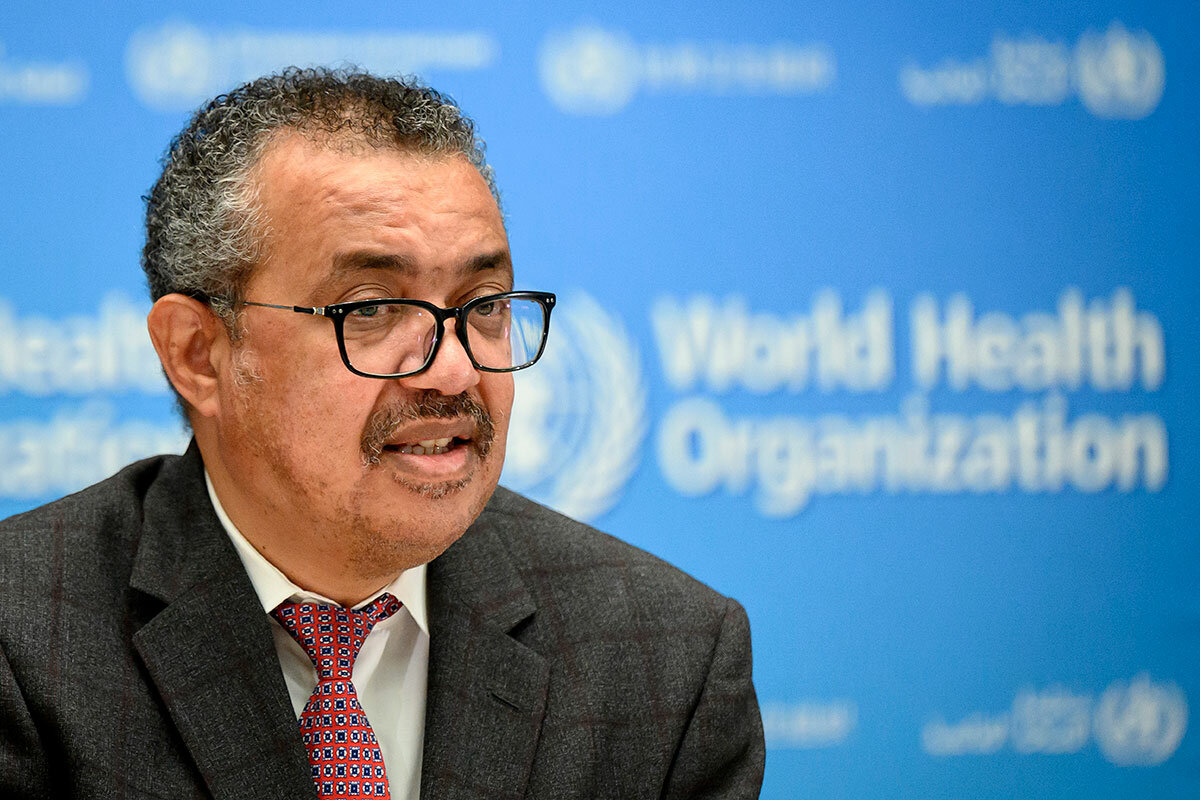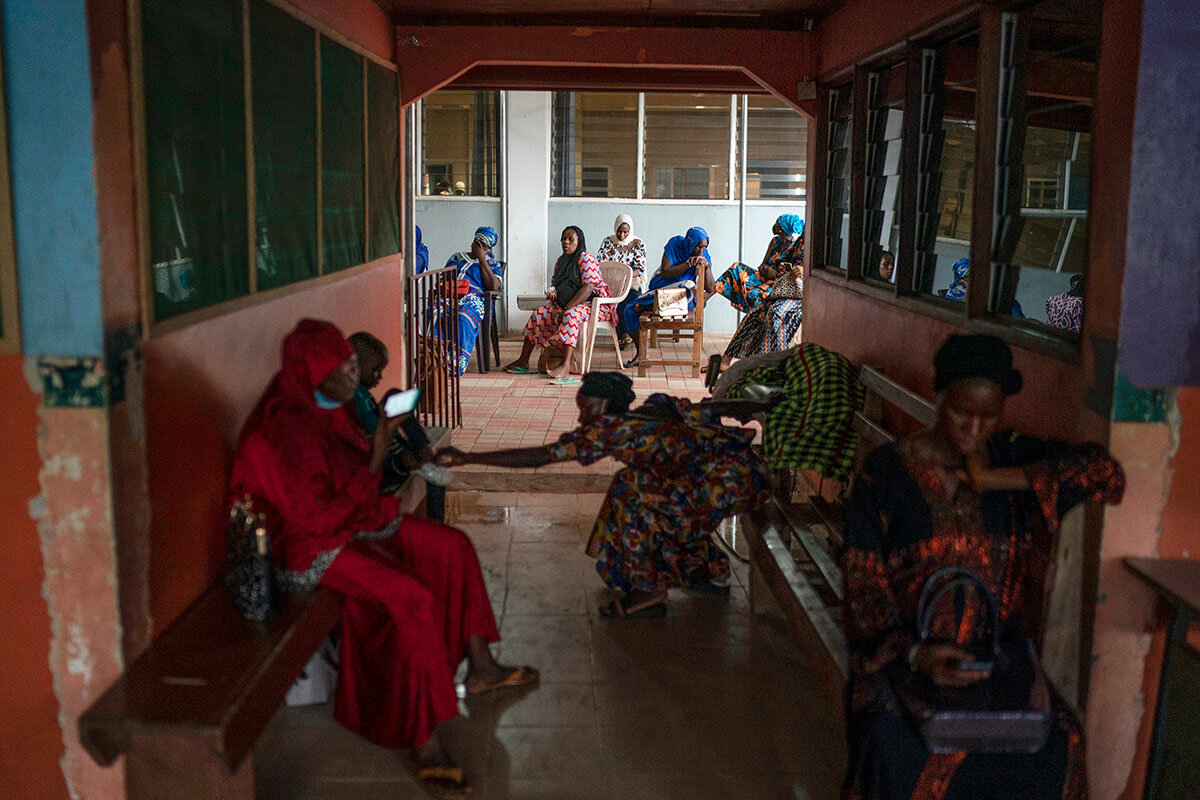Global vaccine equity: Calls rise to put principle into practice
Loading...
| Washington; Johannesburg; Berlin; and Dakar, Senegal
When Gambia received its first shipment of 36,000 doses of COVID-19 vaccine in March through the global initiative COVAX, the mood at the West African country’s Health Ministry was upbeat.
“We gave people their first doses, and told them the date to come back for the second,” says Mustapha Bittaye, the ministry’s director of health services.
That initial shipment and the ability to plan for vaccination follow-through nurtured a sense that the world was making good on an early-pandemic commitment. In a rush of both altruism and self-interest, wealthy countries and international institutions had created COVAX in April 2020, pledging to ensure global access to coronavirus vaccines – including in the world’s poorest countries.
Why We Wrote This
The concept of vaccine equity has always been supported by a combination of altruism and self-interest. To combat the still-undefeated pandemic, is the world ready to act on principle?
Indeed, underpinning COVAX was both recognition of the concept of vaccine equity and the understanding that a pandemic in a highly globalized world meant that no country could hope to defeat COVID-19 on its own. According to epidemiologists, the unchecked spread of the virus in unvaccinated populations increases the possibility that mutated variants of the virus could emerge that are deadlier, impervious to existing vaccines, or both.
But that early sentiment of “we’re all in this together” soon yielded to domestic pressures and the impulse to take care of one’s own. As wealthy countries with the financial means bought up and hoarded vaccine supplies, a global plan for vaccine distribution was outpaced by bilateral agreements between countries and vaccine manufacturers.
In Gambia, that meant a vaccination program launched with buoyant hope ground to a halt. Months passed without a second shipment of doses. Subsequent shipments arrived with little advance notice, often differing from what had been promised, and sometimes on the verge of expiration.
“People were calling us every day, asking when they would receive their second dose,” Dr. Bittaye says. “We simply didn’t know.”
The debilitating uncertainty and disappointment Gambia experienced have been repeated across much of Africa and in other of the world’s poorest countries.
Initially hailed as the great equalizer in getting the world vaccinated, COVAX has distributed just 5% of the world’s COVID-19 vaccines. One result: Africa has vaccinated only about 6% of a population of about 1.4 billion, according to the World Health Organization (WHO).
The world was reminded why that matters when the omicron variant of the coronavirus emerged late last month, apparently originating in South Africa. By Friday, cases of the new strain had been reported in a few dozen countries, including the United States. Uncertainty over the new variant, thought to be highly contagious, tumbled financial markets, and countries imposed travel bans to try to contain its spread.
Omicron’s message
Yet for many global health experts, omicron’s emergence underscores the practical wisdom behind the lofty-sounding vaccine equity that created COVAX. Moreover, they add, it should prompt a rededication to the idea that in a pandemic, helping others is as much about self-preservation as it is about charity.
“We can criticize COVAX, but ultimately they are the world’s proposal for addressing this pandemic, and it was the world that didn’t follow through on taking vaccine equity seriously,” says Richard Marlink, director of Rutgers’ Global Health Institute and an expert on African health systems.
“The point that vaccine equity is not just altruism but is critical for getting out of this pandemic is still the main lesson to be learned,” he adds. “Clearly we haven’t learned it yet.”
Some leaders and international health officials have seized on the emergence of a new coronavirus strain to chide the world on the poor results of the global vaccination campaign.
“The people of Africa cannot be blamed for the immorally low level of vaccinations available to them,” United Nations Secretary-General António Guterres declared in the wake of the omicron discovery.
“We understand and support every government’s responsibility to protect its own people; it’s natural,” said Tedros Adhanom Ghebreyesus, WHO director-general, at a special WHO assembly this week. “But vaccine equity is not charity; it’s in every country’s best interests. No country can vaccinate its way out of the pandemic alone.”
The disconnect between COVAX’s marching orders and the reality of what it would be able to accomplish didn’t take long to materialize, international health experts say.
While the initiative consisting of international institutions including UNICEF and Gavi, the global vaccine alliance, was focused on securing funding for purchasing doses, wealthy countries were negotiating with vaccine manufacturers and buying up months of production that was still only scaling up.
Another setback came when COVAX’s primary supplier, Serum Institute of India, was barred in the spring from exporting vaccine doses.
The export ban was India’s response to a sudden surge in infections following emergence of the virus’s delta variant. But it also bolstered COVAX critics who had warned that relying too much on one manufacturer could be disastrous.
The cutoff of anticipated supplies sent some countries that had signed on to COVAX out to the global market to see what they could find – and afford. What they encountered was disheartening.
“Countries left in the lurch by [India’s] export controls turned either individually or in groups like the African Union to negotiate with manufacturers for supply, but what they encountered was a little bit like the Wild West,” says Katherine Bliss, an expert in health systems resilience at the Center for Strategic and International Studies’ Global Health Policy Center in Washington. That survival-of-the-fittest (or wealthiest) environment “did not favor the world’s poorest countries,” she adds.
Cause for some optimism
Still, some experts say they are seeing reasons for cautious optimism about what lies ahead for global vaccine distribution and vaccination rates.
At Gavi, officials point out that COVAX has shipped 223 million doses to Africa, with another 289 million allocated. A half-billion doses would be enough to cover Africa’s frontline workers and the most vulnerable populations, including older people, a Gavi spokesperson says.
Moreover, Gavi contends the global vaccination effort has entered a new phase in which supplies are more plentiful and deliveries more predictable – facilitating planning.
At the same time, diplomatic activity around vaccine delivery has picked up, notes Ms. Bliss. She points to a recent Group of 20 ministerial meeting on COVID-19 vaccine distribution and on-the-ground delivery, and to Secretary of State Antony Blinken’s recent Africa trip, which was largely focused on boosting Africa’s vaccination rates.
Another point of progress that health experts point to is a diversification of vaccine manufacturing. New facilities planned for Africa by big Western vaccine manufacturers will help the continent move away from imports and donations, says Phionah Atuhebwe, a Ugandan doctor and WHO vaccine official based in Brazzaville, Congo.
Indeed, in an emerging environment of increased vaccine availability and improved distribution, some experts say the focus must now shift to overcoming vaccine hesitancy. That tendency already existed in many societies, but has been fed over the pandemic by disappointment and distrust of governments that haven’t delivered on trumpeted vaccination campaigns.
Add to that a proliferation of misinformation and vaccine conspiracy theories on social media, and governments have a new hurdle in the lack of trust they face from some – and a sense among others that the pandemic is already waning.
Rama Sy, who heads up vaccination programs in the Ngor neighborhood of Senegal’s capital, Dakar, says that what is needed now is better messaging to reach reticent members of the public.
“We need to keep raising awareness,” says Ms. Sy, who now has a mix of American, Chinese, and European vaccines to administer. “Now people have heard there’s another variant, there are people coming to get vaccinated,” she says. “But when the cases diminish, they stay home.”
Where the world did better
Dr. Marlink of Rutgers says the failure to live up to the promise of vaccine equity largely explains why the world is only now getting to this point of improving vaccine availability and distribution.
But he says an example exists of how the world has done better at meeting a global public health crisis – and how it can do better at addressing a future pandemic earlier and more equitably.
He points to PEPFAR, the President’s Emergency Plan for AIDS Relief, established by President George W. Bush in 2003. It is now the largest commitment ever by any nation to address a single disease, reaching more than 50 countries.
“There was a lot of discussion and international debate on how to address the AIDS crisis, but it took the United States saying ‘We’re going to go ahead and do this’ for PEPFAR to happen,” Dr. Marlink says. “And it took the U.S. saying ‘We’re going to go ahead and do this using the B word’ – as in the billions of dollars the U.S. committed to it from the beginning,” he adds.
Yet while the U.S. and other wealthy countries may be financially capable of making such a program happen, health experts say it will require a renewed commitment to COVAX’s original stated mission – that ending the pandemic anywhere means ending it everywhere.
The emergence of the omicron variant “is a very telling example of how the virus continues to mutate, particularly in the absence of equitable access” to vaccines, says Candice Sehoma, an advocacy officer for Doctors Without Borders in South Africa. “It underscores why there’s a need for global solidarity and sharing of resources.”






